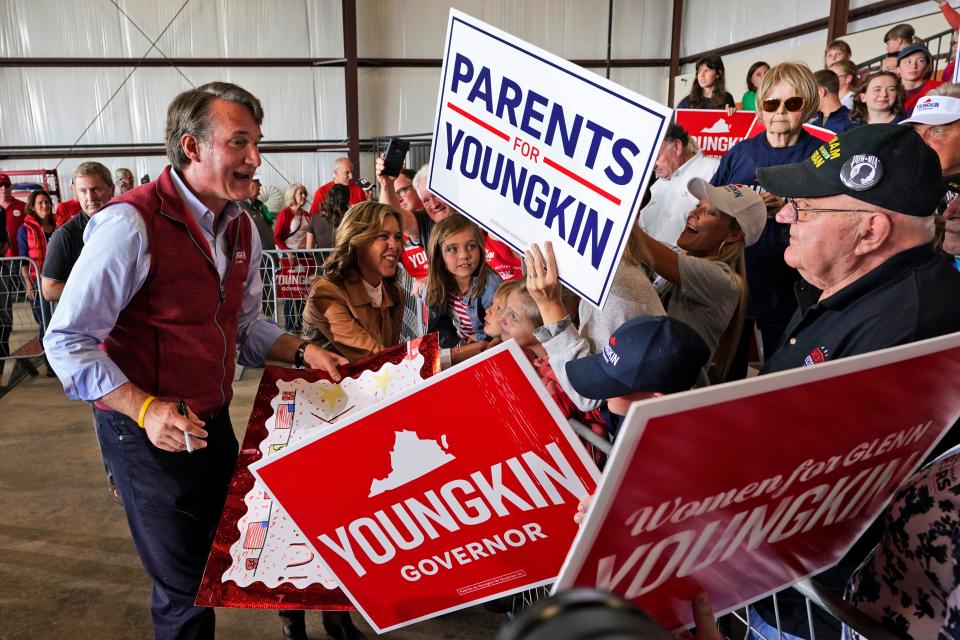Red alert: Crushing defeat in Virginia could signal trouble for Democrats ahead
- Oops!Something went wrong.Please try again later.
- Oops!Something went wrong.Please try again later.
- Oops!Something went wrong.Please try again later.
- Oops!Something went wrong.Please try again later.
Neither contest was supposed to be close, not at first.
But in Virginia Tuesday night, the victory in the governor's election was scored not by Democrat Terry McAuliffe – rated the favorite when the race began – but by Republican Glenn Youngkin.
In New Jersey, an even stronger Democratic stronghold, Gov. Phil Murphy narrowly defeated Republican Jack Ciattarelli in a race not called until Wednesday evening.
The results fortified Republican hopes of winning back control of the House and the Senate in next year's midterms. They complicated President Joe Biden's embattled efforts to push his ambitious agenda through a Congress under Democratic control, albeit narrowly.
And they revealed how much the political landscape has been transformed in the year since euphoric Democrats celebrated winning back the White House and holding the House, then seizing control of the Senate with breathtaking victories in two Georgia elections.
The appetite for change that boosted Democrats last time undercut them now. The message from voters, in their ballots and in exit polls, was that the politicians in power weren't doing enough to address their concerns – about crime and inflation and parental control of their kids' education. A majority in Virginia said the Democratic Party had moved too far left.
Democrats lost up and down the ballot. In Virginia, Republican Winsome Sears won the lieutenant governorship – becoming the first Black woman elected to statewide office in the commonwealth's history – and Republican Jason Miyares ousted the incumbent Democratic attorney general. Republicans flipped control of the House of Delegates, .

The repercussions are sure to ripple well beyond the borders of the only two states that elect governors in the off-year.
In his first bid for public office, Youngkin gave Republicans a template to succeed even in places Biden carried by double digits in the presidential campaign one year ago.
For Republicans, the good news will bolster efforts to recruit strong candidates and raise money for next year's midterms. GOP prospects in governors' races instantly improved, including for the eight seats held by Democrats in states that Biden carried by narrower margins than in Virginia.
For Democrats, the bad news may prompt some incumbents in Congress, unhappy about a possible return to minority status, to consider retiring or running for some other office. It could alarm congressional Democrats from swing districts about attacks by opponents – and blowback from voters – if they support Biden's stalled $1.75 trillion spending bill.
It might even affect calculations on the 2024 presidential election.
"I would like to thank my BASE for coming out in force and voting for Glenn Youngkin," Trump said in a statement that took credit for the victory hours before news organizations called the race. "Without you, he would not have been close to winning. The MAGA movement is bigger and stronger than ever before."
Don't miss a story: Sign up here for our OnPolitics newsletter
Youngkin walked a Trump-not-Trump tightrope, reaping the benefit of Trump's endorsement among his core supporters without antagonizing the independent-minded suburban voters who have been repelled by the former president. He increased turnout in rural and conservative areas that Trump carried while faring better than Trump in the Democratic-leaning suburbs of Northern Virginia and Richmond.
A multimillionaire who made his fortune as a private equity executive, Youngkin projected an earnest soccer dad demeanor, favoring fleece vests on the stump. He blasted Democrats as dangerously liberal and tapped a cauldron of culture war concerns surrounding education – including the teaching about racism in American history, the treatment of transgender children and the mandates for masks and COVID-19 vaccines.
McAuliffe had his own advantages. He was a well-funded and energetic campaigner who had served a previous term as governor. He booked the biggest names in the Democratic ranks to campaign with him, from Biden and former President Barack Obama to rising star Stacey Abrams.

Biden is no longer significantly more popular in Virginia than Trump, the opponent he defeated there by 10 percentage points in 2020. In exit polls taken by Edison Research for a consortium of news organizations, Biden's approval-disapproval rate was 45%-54%; Trump's was 42%-54%.
The off-year contests don't always signal what will happen next, but pols pay attention to them because they sometimes do.
For Democrats, Tuesday was an unwelcome echo of 2009. In the election a year after Obama won the White House, the centerpiece of the new president's domestic agenda, the Affordable Care Act, was enmeshed in a messy congressional debate.
Then, Republicans swept the statewide races in Virginia, winning the governorship for the last time until Tuesday's victory for Youngkin. In the midterms that followed in 2010, Democrats were crushed in Congress. They lost 63 seats and with that control of the House.
Next year, Democrats can afford to lose only five.
This article originally appeared on USA TODAY: McAuliffe loss, Youngkin win in Virginia signals trouble for Democrats

